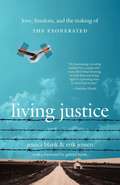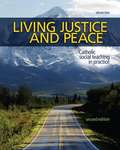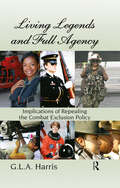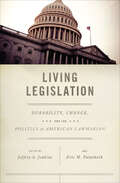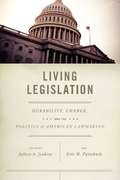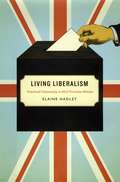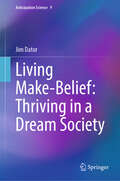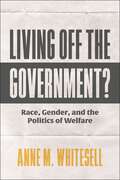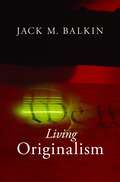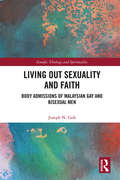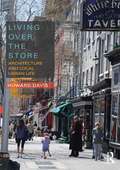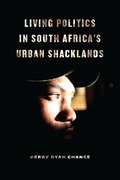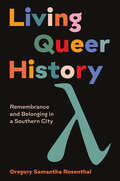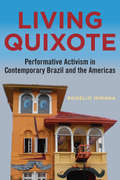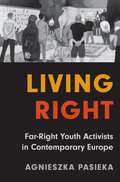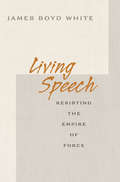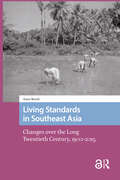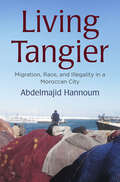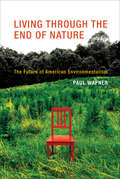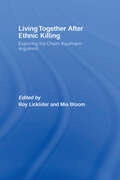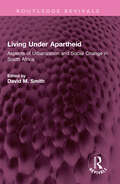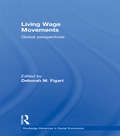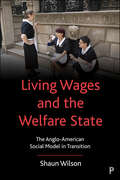- Table View
- List View
Living Justice
by Jessica Blank Erik JensenA love story. An artistic journey. A matter of life and death... In 2000, Jessica Blank and Erik Jensen embarked on a tour across America -- one that would give them a glimpse of the darker side of the justice system and, at the same time, reveal to them just how resilient the human spirit can be. They were a pair of young actors from New York who wanted to learn more about our country's exonerated -- men and women who had been sentenced to die for crimes they didn't commit, who spent anywhere from two to twenty-two years on death row, and who were freed amidst overwhelming evidence of their innocence. The result of their journey was The Exonerated, New York Times number one play of 2002, which was embraced by such acting luminaries as Ossie Davis, Richard Dreyfuss, Danny Glover, Tim Robbins, Susan Sarandon, and Robin Williams. Living Justice is Jessica and Erik's fascinating, behind-the-scenes account of the creation of their play. A tale of artistic expression and political awakening, innocence lost and wisdom won, this is above all a story about two people who fall in love while pursuing their passion and learn -- through the stories of the exonerated -- what freedom truly means.
Living Justice and Peace: Catholic Social Teaching in Practice (2nd edition)
by Jerry Windley-DaoustThe Living Justice and Peace course empowers students to examine society critically based on values from the Scriptures and on the seven themes of Catholic Social Teaching. The text addresses specific topics including abortion, capital punishment, racism, poverty, the environment, and peace.
Living Legends and Full Agency: Implications of Repealing the Combat Exclusion Policy (Public Administration And Public Policy Ser.)
by G.L.A. HarrisWINNER OF THE 2017 ASPA SECTION ON PERSONNEL ADMINISTRATION AND LABOR RELATIONS OUTSTANDING BOOK AWARD! This research and policy book examines the role of women in the military and the overwhelming evidence to date that warranted repealing the combat exclusion policy. It explores the following questions: How can the success of women in the mil
Living Legislation: Durability, Change, and the Politics of American Lawmaking
by William J. Novak Jeffrey E. Cohen David R. Mayhew William G. Howell Forrest Maltzman Matthew Eshbaugh-Soha Barry C. Burden Vesla M. Weaver Stuart Chinn Sidney M. Milkis Amihai Glazer Sean Gailmard David E. Lewis Charles R. Shipan Christopher R. BerryPolitical scholars examine the dynamic evolution of laws over time in a volume that &“pushes the frontiers of knowledge about lawmaking in the US&” (Choice). Politics is at its most dramatic during debates over important pieces of legislation. And while debates over legislative measures can rage for years or even decades before an item is enacted, they also endure long afterward, when the political legacy of a law eventually comes into focus. With a diverse set of contributors—including quantitative political scientists, political development scholars, historians, and economists—Living Legislation provides fresh insights into contemporary American politics and public policy. Many of the contributors to this volume focus on the question of why some laws stand the test of time while others are eliminated, replaced, or significantly amended. Others discuss how laws emerge from—and effect change within—coalition structures; the effectiveness of laws at mediating partisan conflicts; and the ways in which laws interact with broader shifts in the political environment. An essential addition to the study of politics, Living Legislation enhances understanding of democracy, governance, and power.
Living Legislation: Durability, Change, and the Politics of American Lawmaking
by Jenkins Jeffery Patashnik Eric M.Politics is at its most dramatic during debates over important pieces of legislation. It is thus no stretch to refer to legislation as a living, breathing force in American politics. And while debates over legislative measures begin before an item is enacted, they also endure long afterward, when the political legacy of a law becomes clear. Living Legislation provides fresh insights into contemporary American politics and public policy. Of particular interest to the contributors to this volume is the question of why some laws stand the test of time while others are eliminated, replaced, or significantly amended. Among the topics the essays discuss are how laws emerge from--and effect change within--coalition structures, the effectiveness of laws at mediating partisan conflicts, and the ways in which laws interact with broader shifts in the political environment. As an essential addition to the study of politics, Living Legislation enhances understanding of democracy, governance, and power.
Living Liberalism: Practical Citizenship in Mid-Victorian Britain
by Elaine HadleyIn the mid-Victorian era, liberalism was a practical politics: it had a party, it informed legislation, and it had adherents who identified with and expressed it as opinion. It was also the first British political movement to depend more on people than property, and on opinion rather than interest. But how would these subjects of liberal politics actually live liberalism?To answer this question, Elaine Hadley focuses on the key concept of individuation—how it is embodied in politics and daily life and how it is expressed through opinion, discussion and sincerity. These are concerns that have been absent from commentary on the liberal subject. Living Liberalism argues that the properties of liberalism—citizenship, the vote, the candidate, and reform, among others—were developed in response to a chaotic and antagonistic world. In exploring how political liberalism imagined its impact on Victorian society, Hadley reveals an entirely new and unexpected prehistory of our modern liberal politics. A major revisionist account that alters our sense of the trajectory of liberalism, Living Liberalism revises our understanding of the presumption of the liberal subject.
Living Make-Belief: Thriving in a Dream Society (Anticipation Science #9)
by Jim DatorThis book shows how multiple developments have caused the world to move from “an information society” to a “dream society”. Ongoing social and technological forces are pushing us from a world of words, rationality, and truth into a world of images, performance, and make-belief. Rather than deny or reject this transformation, this book argues that one should understand and embrace it as waves of new futures that the world must strive to surf for fame and fun. As a political scientist and futurist, the author also offers hints of new goals and forms of governance fit for a dream society, as he demonstrates that all current systems are ineffective and dangerously obsolete. This book is of great interest to political philosophers, futures scientists, sociologists, and those interested in cultural studies.
Living Off the Government?: Race, Gender, and the Politics of Welfare
by Anne M. WhitesellExplores the ways welfare recipients lack adequate political representationWho deserves public assistance from the government? This age-old question has been revived by policymakers, pundits, and activists following the massive economic impact of the COVID-19 pandemic. Anne Whitesell takes up this timely debate, showing us how our welfare system, in its current state, fails the people it is designed to serve. From debates over stimulus check eligibility to the uncertain future of unemployment benefits, Living Off the Government? tackles it all.Examining welfare rules across eight different states, as well as 19,000 state and local interest groups, Whitesell shows how we determine who is—and who isn't—deserving of government assistance. She explores racial and gender stereotypes surrounding welfare recipients, particularly Black women and mothers; how different groups take advantage of these harmful stereotypes to push their own political agendas; and how the interests and needs of welfare recipients are inadequately represented as a result.Living Off the Government? highlights how harmful stereotypes about the race, gender, and class of welfare recipients filter into our highly polarized political arena to shape public policy. Whitesell calls out a system that she believes serves special interests and not the interests of low-income Americans.
Living Originalism
by Jack M. BalkinOriginalism and living constitutionalism, so often understood to be diametrically opposing views of our nation’s founding document, are not in conflict—they are compatible. So argues Jack Balkin, one of the leading constitutional scholars of our time, in this long-awaited book. Step by step, Balkin gracefully outlines a constitutional theory that demonstrates why modern conceptions of civil rights and civil liberties, and the modern state’s protection of national security, health, safety, and the environment, are fully consistent with the Constitution’s original meaning. And he shows how both liberals and conservatives, working through political parties and social movements, play important roles in the ongoing project of constitutional construction. By making firm rules but also deliberately incorporating flexible standards and abstract principles, the Constitution’s authors constructed a framework for politics on which later generations could build. Americans have taken up this task, producing institutions and doctrines that flesh out the Constitution’s text and principles. Balkin’s analysis offers a way past the angry polemics of our era, a deepened understanding of the Constitution that is at once originalist and living constitutionalist, and a vision that allows all Americans to reclaim the Constitution as their own.
Living Out Sexuality and Faith: Body Admissions of Malaysian Gay and Bisexual Men (Gender, Theology and Spirituality)
by Joseph N. GohSexuality, religion and faith often have complex and conflicting interactions, on both personal and societal levels. Numerous studies have been conducted on queer subjects, but they have predominantly focused on ‘Western’ expressions of faith and queer identities. This book contributes to the wider scholarship on queer subjects by drawing on actual lived experiences of self-identifying gay and bisexual men in Malaysia. It discusses what we can learn from the realities of their lives that intersect with their religious, spiritual, theological or humanistic values in an Asian context. Analysed within the critical frameworks of queer theory and queer sexual theology, this study divulges the meanings ascribed to sexual identities and practices, as well as conceptualisations of masculinity, sexual desire, love and intimate physical connections. It also lays bare the complex negotiations between gender, desire and spirit, and how they can affect one another. Tying fascinating case studies and underexplored Asian theologies with wider conversations around sexuality and faith, this book will be of significant interest to scholars working in religious studies, theology, queer studies, sexuality studies and Asian studies.
Living Over the Store: Architecture and Local Urban Life
by Howard DavisThe shop/house – the building combining commercial/retail uses and dwellings – appears over many periods of history in most cities in the world. This book combines architectural history, cross-cultural understandings and accounts of contemporary policy and building practice to provide a comprehensive account of this common but overlooked building. The merchant's house in northern European cities, the Asian shophouse, the apartment building on New York avenues, typical apartment buildings in Rome and in Paris – this variety of shop/houses along with the commonality of attributes that form them, mean that the hybrid phenomenon is as much a social and economic one as it is an architectural one. Professionals, city officials and developers are taking a new look at buildings that allow for higher densities and mixed-use. Describing exemplary contemporary projects and issues pertaining to their implementation as well as the background, cultural variety and urban attributes, this book will benefit designers dealing with mixed-use buildings as well as academics and students.
Living Politics in South Africa’s Urban Shacklands
by Kerry Ryan ChanceWhile much has been written on post-apartheid social movements in South Africa, most discussion centers on ideal forms of movements, disregarding the reality and agency of the activists themselves. In Living Politics, Kerry Ryan Chance radically flips the conversation by focusing on the actual language and humanity of post-apartheid activists rather than the external, idealistic commentary of old. Tracking everyday practices and interactions between poor residents and state agents in South Africa’s shack settlements, Chance investigates the rise of nationwide protests since the late 1990s. Based on ethnography in Durban, Cape Town, and Johannesburg, the book analyzes the criminalization of popular forms of politics that were foundational to South Africa’s celebrated democratic transition. Chance argues that we can best grasp the increasingly murky line between “the criminal” and “the political” with a “politics of living” that casts slum and state in opposition to one another. Living Politics shows us how legitimate domains of politics are redefined, how state sovereignty is forcibly enacted, and how the production of new citizen identities crystallize at the intersections of race, gender, and class.
Living Queer History: Remembrance and Belonging in a Southern City
by Gregory Samantha RosenthalQueer history is a living practice. Talk to any group of LGBTQ people today, and they will not agree on what story should be told. Many people desire to celebrate the past by erecting plaques and painting rainbow crosswalks, but queer and trans people in the twenty-first century need more than just symbols—they need access to power, justice for marginalized people, spaces of belonging. Approaching the past through a lens of queer and trans survival and world-building transforms history itself into a tool for imagining and realizing a better future. Living Queer History tells the story of an LGBTQ community in Roanoke, Virginia, a small city on the edge of Appalachia. Interweaving &8239;historical analysis, theory, and memoir, Gregory Samantha Rosenthal tells the story of their own journey—coming out and transitioning as a transgender woman—in the midst of working on a community-based history project that documented a multigenerational southern LGBTQ community. Based on over forty interviews with LGBTQ elders, Living Queer History explores how queer people today think about the past and how history lives on in the present.
Living Quixote: Performative Activism in Contemporary Brazil and the Americas (Performing Latin American and Caribbean Identities)
by Rogelio MinanaThe 400th anniversaries of Don Quixote in 2005 and 2015 sparked worldwide celebrations that brought to the fore its ongoing cultural and ideological relevance. Living Quixote examines contemporary appropriations of Miguel de Cervantes's masterpiece in political and social justice movements in the Americas, particularly in Brazil.In this book, Cervantes scholar Rogelio Miñana examines long-term, Quixote-inspired activist efforts at the ground level. Through what the author terms performative activism, Quixote-inspired theater companies and nongovernmental organizations deploy a model for rewriting and enacting new social roles for underprivileged youth. Unique in its transatlantic, cross-historical, and community-based approach, Living Quixote offers both a new reading of Don Quixote and an applied model for cultural activism—a model based, in ways reminiscent of Paulo Freire, on the transformative potential of performance, literature, and art.
Living Quixote: Performative Activism in Contemporary Brazil and the Americas (Performing Latin American and Caribbean Identities)
by Rogelio MinanaThe 400th anniversaries of Don Quixote in 2005 and 2015 sparked worldwide celebrations that brought to the fore its ongoing cultural and ideological relevance. Living Quixote examines contemporary appropriations of Miguel de Cervantes's masterpiece in political and social justice movements in the Americas, particularly in Brazil. In this book, Cervantes scholar Rogelio Miñana examines long-term, Quixote-inspired activist efforts at the ground level. Through what the author terms performative activism, Quixote-inspired theater companies and nongovernmental organizations deploy a model for rewriting and enacting new social roles for underprivileged youth. Unique in its transatlantic, cross-historical, and community-based approach, Living Quixote offers both a new reading of Don Quixote and an applied model for cultural activism—a model based, in ways reminiscent of Paulo Freire, on the transformative potential of performance, literature, and art.
Living Right: Far-Right Youth Activists in Contemporary Europe
by Agnieszka PasiekaA sobering look at the seductive power of fascist ideas for the youngRadical nationalism is on the rise in Europe and throughout the world. Living Right provides an in-depth account of the ideas and practices that are driving the varied forms of far-right activism by young people from all walks of life, revealing how these social movements offer the promise of comradery, purpose, and a moral calling to self-sacrifice, and demonstrating how far-right ideas are understood and lived in ways that speak to a variety of experiences.In this eye-opening book, Agnieszka Pasieka draws on her own sometimes harrowing fieldwork among Italian, Polish, and Hungarian militant youths, painting unforgettable portraits of students, laborers, entrepreneurs, musicians, and activists from well-off middle class backgrounds who have all found a nurturing home in the far right. Providing an in-depth account of radical nationalist communities and networks that are taking root across Europe, she shows how the simultaneous orientation of these groups toward the local and the transnational is a key to their success. With a focus on far-right morality that challenges commonly held ideas about the right, Pasieka describes how far-right movements afford opportunities to the young to be active members of tightly bonded comradeships while sharing in a broader project with global ramifications.Required reading for anthropologists and anyone concerned about the resurgence of far-right militancy today, Living Right sheds necessary light on the forces that have made the growing appeal of fascist idealism for young people one of the most alarming trends of our time.
Living Speech: Resisting the Empire of Force
by James Boyd WhiteLanguage is our key to imagining the world, others, and ourselves. Yet sometimes our ways of talking dehumanize others and trivialize human experience. In war other people are imagined as enemies to be killed. The language of race objectifies those it touches, and propaganda disables democracy. Advertising reduces us to consumers, and clichés destroy the life of the imagination. How are we to assert our humanity and that of others against the forces in the culture and in our own minds that would deny it? What kind of speech should the First Amendment protect? How should judges and justices themselves speak? These questions animate James Boyd White's Living Speech, a profound examination of the ethics of human expression--in the law and in the rest of life. Drawing on examples from an unusual range of sources--judicial opinions, children's essays, literature, politics, and the speech-out-of-silence of Quaker worship--White offers a fascinating analysis of the force of our languages. Reminding us that every moment of speech is an occasion for gaining control of what we say and who we are, he shows us that we must practice the art of resisting the forces of inhumanity built into our habits of speech and thought if we are to become more capable of love and justice--in both law and life.
Living Standards in Southeast Asia: Changes over the Long Twentieth Century, 1900-2015 (Transforming Asia)
by Anne BoothLiving Standards in Southeast Asia: Changes over the Long Twentieth Century, 1900-2015 examines changes in living standards across the ten countries of Southeast Asia (Indonesia, Malaysia, Singapore, Philippines, Thailand, Brunei, Myanmar, Vietnam, Cambodia and Laos) from the early years of the 20th century to the early 21st century. It covers both the last decades of the colonial period, the transition to independence and the decades from 1960 to the 2010s. The study uses a range of monetary and non-monetary indicators to assess how living standards have changed over time. It examines the outcomes in the context of debates about economic growth, inequality and poverty alleviation which began in the 1960s and 1970s, and continue to the present.
Living Streets: Strategies for Crafting Public Space
by Lesley Bain Barbara Gray Dave RodgersThe only book of its kind to provide an overview of sustainable street design Today, society is moving toward a more sustainable way of life, with cities everywhere aspiring to become high-quality places to live, work, and play. Streets are fundamental to this shift. They define our system of movement, create connections between places, and offer opportunities to reconnect to natural systems. There is an increasing realization that the right-of-way is a critical and under-recognized resource for transformation, with new models being tested to create a better public realm, support balanced transportation options, and provide sustainable solutions for stormwater and landscaping. Living Streets provides practical guidance on the complete street approach to sustainable and community-minded street use and design. Written by an interdisciplinary team of authors, the book brings insights and experience from urban planning, transportation planning, and civil engineering perspectives. It includes examples from many completed street design projects from around the world, an overview of the design and policy tools that have been successful, and guidance to help get past the predictable obstacles to implementation: Who makes decisions in the right-of-way? Who takes responsibility? How can regulations be changed to allow better use of the right-of-way? Living Streets informs you of the benefits of creating streets that are healthier, more pleasant parts of life: Thoughtful planning of the location, uses, and textures of the spaces in which we live encourages people to use public space more often, be more active, and possibly live healthier lives. A walkable community makes life easier and more pleasant for everyone, especially for vulnerable populations within the larger community whose transportation limitations reduce access to jobs, healthy food, health care, recreation, and social interaction. Streets present opportunities to improve the natural environment while adding to neighborhood character, offering beauty, providing shade, and improving air quality. If you're an urban planner, designer, transportation engineer, or civil engineer, Living Streets is the ultimate guide for the creation of more humane streetscapes that connect neighborhoods and inspire people.
Living Tangier: Migration, Race, and Illegality in a Moroccan City (Contemporary Ethnography)
by Abdelmajid HannoumSince the early 1990s, new migratory patterns have been emerging in the southern Mediterranean. Here, a large number of West Africans and young Moroccans, including minors, make daily attempts to cross to Europe. The Moroccan city of Tangier, because of its proximity to Spain, is one of the main gateways for this migratory movement. It has also become a magnet for middle- and working-class Europeans seeking a more comfortable life.Based on extensive fieldwork, Living Tangier examines the dynamics of transnational migration in a major city of the Global South and studies African "illegal" migration to Europe and European "legal" migration to Morocco, looking at the itineraries of Europeans, West Africans, and Moroccan children and youth, their strategies for crossing, their motivations, their dreams, their hopes, and their everyday experiences. In the process, Abdelmajid Hannoum examines how Moroccan society has been affected by the flows of migrants from both West Africa and Europe, focusing on race relations and analyzing issues related to citizenship and social inequality. Living Tangier considers what makes the city one of the most attractive for migrants preparing to cross to Europe and illustrates not only how migrants live in the city but also how they live the city—how they experience it, encounter its people, and engage its culture, walk its streets, and participate in its events.Reflecting on his own experiences and drawing on the work of Hannah Arendt, Edward Said, Tayeb Saleh, Amin Maalouf, and Dany Laferrière, Hannoum provokes new questions in order to reconfigure migration as a postcolonial phenomenon and interrogate how Moroccan society responds to new cultural processes.
Living Through the End of Nature: The Future of American Environmentalism (The\mit Press Ser.)
by Paul WapnerHow environmentalism can reinvent itself in a postnature age: a proposal for navigating between naive naturalism and technological arrogance.Environmentalists have always worked to protect the wildness of nature but now must find a new direction. We have so tamed, colonized, and contaminated the natural world that safeguarding it from humans is no longer an option. Humanity's imprint is now everywhere and all efforts to “preserve” nature require extensive human intervention. At the same time, we are repeatedly told that there is no such thing as nature itself—only our own conceptions of it. One person's endangered species is another's dinner or source of income. In Living Through the End of Nature, Paul Wapner probes the meaning of environmentalism in a postnature age. Wapner argues that we can neither go back to a preindustrial Elysium nor forward to a technological utopia. He proposes a third way that takes seriously the breached boundary between humans and nature and charts a co-evolutionary path in which environmentalists exploit the tension between naturalism and mastery to build a more sustainable, ecologically vibrant, and socially just world.Beautifully written and thoughtfully argued, Living Through the End of Nature provides a powerful vision for environmentalism's future
Living Together After Ethnic Killing: Exploring the Chaim Kaufman Argument
by Mia Bloom Roy LickliderThis volume attempts to critically analyze Chaim Kaufman's ideas from various methodological perspectives, with the view of further understanding how stable states may arise after violent ethnic conflict and to generate important debate in the area. After the Cold War, the West became optimistic of their ability to intervene effectively in instances of humanitarian disasters and civil war. Unfortunately, in the light of Bosnia, Somalia and Rwanda, questions of the appropriate course of action in situations of large scale violence became hotly contested. A wave of analysis considered the traditional approach of third parties attempting to ensure that the nation was built on the basis of a ruling power-share between the opposing sides of the conflict to be overwhelmingly problematic, and perhaps impossible. Within this movement Kaufman wrote a series of articles advocating separation of warring sides in order to provide stability in situations of large scale violence. His theorem provoked extreme responses and polarized opinion, contradicting the established position of promoting power-sharing, democracy and open economies to solve ethnic conflict and had policy implications for the entire international community. This book was previously published as a special issue of Security Studies.
Living Under Apartheid: Aspects of Urbanization and Social Change in South Africa (Routledge Revivals)
by David M. SmithOriginally published in 1982, this book covers the unique spatial structure of society which was South Africa under apartheid. It brings together a cohesive set of research-based contributions to the understanding of this system which was without contemporary parallels. The book considers issues such as industrial location and migrant labour at a national scale. The case studies, which are fully illustrated, deal with problems associated with work and housing for blacks, set in the 3 major metropolitan areas of Cape Town, the Witwatersrand and Durban. Of particular importance is the emphasis given to so-called ‘spontaneous’ (or ‘squatter’) settlement and to informal-sector work for blacks in the emerging apartheid city – something which links directly with central issues of development studies.
Living Wage Movements: Global Perspectives (Routledge Advances in Social Economics #Vol. 58)
by Deborah M. FigartLiving wage activism has spanned time and space, reaching across decades and national boundaries. Conditions generating living wage movements early in the twentieth century have resurfaced in the twenty-first century, only on a global scale: 'sweated' labour, macroeconomic instability, and job insecurity.Upon reviewing the empirical evidence, the book's contributors make strong cases both for and against living wage activism. The effective blend of historical, contemporary, and global perspectives provides opportunities for teachers, scholars, and activists to evaluate how we can address low pay at the organizational and macroeconomic levels.
Living Wages and the Welfare State: The Anglo-American Social Model in Transition
by Shaun WilsonAre living wages an unaffordable and unwieldy aspiration or a key progressive reform? Demands for fair minimum incomes have dominated national debates amid the COVID-19 pandemic. This topical book addresses the rapidly shifting politics of minimum wages in US, the UK, New Zealand, Canada, Ireland and Australia, where workfare has compelled many to find low-income work and where neoliberal thinking about minimum wages has prevailed. Analysing minimum wage policies within a political-economy narrative, this innovative book offers an alternative to the Basic Income narrative and identifies the success of Living Wage campaigns as central to welfare state change.
